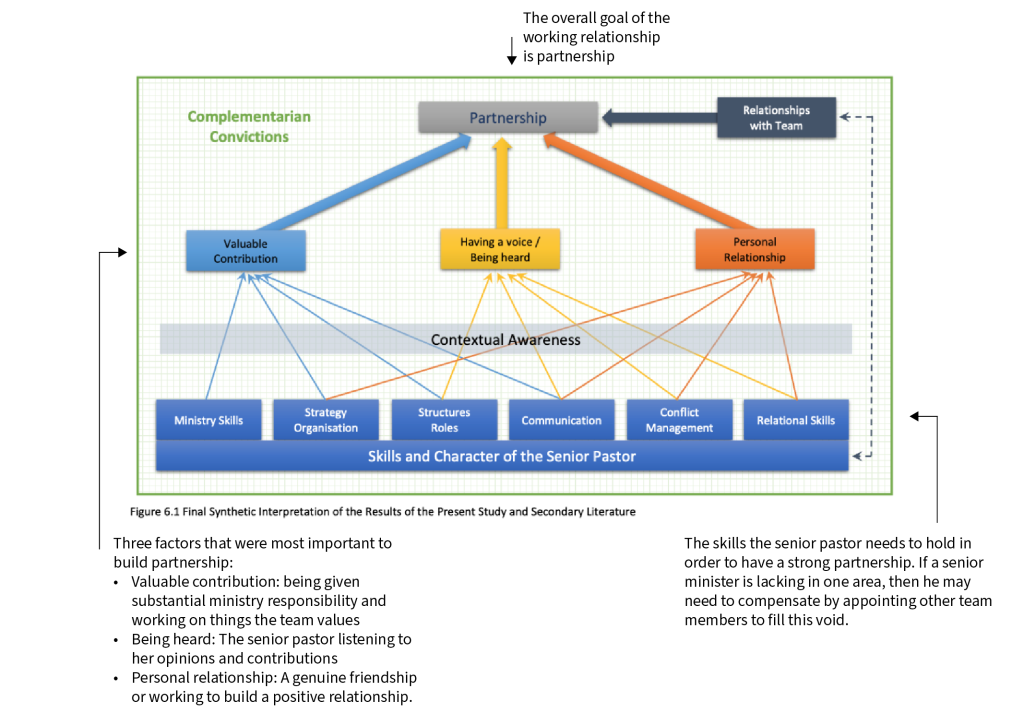Three factors may be the key to building genuine partnerships in ministry between women on teams and their senior pastors.
Clare Deeves set out to explore this area focusing on women employed in Word-based ministries in complementarian, local church contexts in her recently completed PhD research.
Clare was training women for full time ministry at Trinity Theological College in Perth as Academic Dean, but became discouraged when she was hearing stories of women’s roles not working out due to relational breakdowns with their senior pastors. Hearing anecdotes of this happening across the country, Clare wanted to understand this more. She was somewhat surprised by the results of her research.
“Some of [the women] were just really positive, so it’s not the debacle that the anecdotal evidence suggested. There were a number of women who’d only experienced positive relationships with their senior pastors.”
But as she’d expected, there were also women who were struggling or who had left ministry roles because of a breakdown in relationship. Clare wanted to better understand the factors that led to positive experiences for women on ministry teams. One of the key findings was the significant link between the senior pastors’ skills and character, and a positive ministry relationship.
Key points:
- The study identifies factors that build a genuine partnership between senior pastors and the women on their team
- The skills and character of the senior pastor are a key element, shown in their leadership, organisational and communication skills
- Three factors in genuine partnership for women are: making valuable contributions, having a voice and being heard when they speak, and a good, personal relationship with the senior pastor.
Understanding and executing genuine partnership is essential for a good working relationship
Healthy working relationships are founded in genuine partnership in ministry. This means mutual trust and respect, the exchange and development of ideas, freedom in areas of responsibility with regular meetups, and genuine interest in their ministry and personal welfare.
“For women on teams, that genuine partnership is primarily expressed in three things. Firstly, that they are able to make valuable contributions. They’re real and substantial contributions that the senior minister values. Secondly, they’re able to speak and when they do speak, that’s heard. That has implications for meeting structures and dynamics and scope to be involved in decision making. And thirdly, they’ve got a personal relationship that is pretty good,” she said.
Assisting with this is a good contextual awareness by the senior pastor of his team’s different ministry areas and related challenges. The more a senior pastor understands the particular challenges and stressors of an assistant’s ministry, the more he is able to work alongside them in partnership.
There are also important implications for women –
“It would help women to clarify the structure of the working relationship… a job description that’s clear, and a clear understanding of how they fit in the structure of the team.
“They should also get clarity on the meeting arrangements. My research showed if people were meeting regularly, the relationship was much better than when they weren’t.
“Having relational concern for the pastor shows that she values the personal relationship. He probably values knowing that she’s on his side and that she’s going to back him.”
In bigger churches the senior pastor may not have time to form a strong, one-on-one relationship with all of their staff members. Clare’s research has revealed that this isn’t necessarily a problem, as long as the senior minister makes an effort to fill this void.
“There is evidence that good relationships with your team can substitute for a good relationship with your senior pastor,” Clare explains. “That’s not an excuse to have a bad relationship with someone who’s under you, but if you’ve got 20 staff members working under you and you just don’t have that much relational time, what you need to do is facilitate their relationships with one another as a substitute for what you can’t give them.”
A senior minister needs key leadership skills and character
Clare’s research highlights the importance of the senior pastor’s leadership skills and character in building a genuine ministry partnership. Senior pastors need to hold six skills to facilitate this partnership: ministry skills, strategy/organisation, structures/roles, communication, conflict management and relational skills. While each of these elements are needed for any leadership, they also have a direct impact on building a genuine partnership with women on the team. When they’re missing in a complementarian context, it is particularly difficult for female staff to fill the void. While male assistants may feel comfortable leading the change, so long as it is not contrary to the senior pastor’s wishes, complementarian women are rightly more hesitant about taking that role.
Listening is key to valuing each other
Clare hopes her research will help senior pastors realise “it’s not rocket science” to build an effective relationship with a female gospel worker.
“There’s no secret sauce to making these relationships work, and it’s not that different to making it work with your male assistants. It’s hard to believe that a male assistant would be happy to not have a voice or be heard. Those things matter. It does boil down to some pretty simple stuff.”
“The relationship will be better if you listen to the people you work with. Who would have thought? Everybody!”
Clare wants this research to be shared by people working in ministry, and contribute to the development of more healthy gospel partnerships in ministry teams.
Clare Deeves is the Assistant Minister (Women) at Kallaroo Anglican Church in Perth. She has a Masters in Divinity, Diploma of Divinity and Mission, a Masters of Theology in Church History and has just completed her PhD through the Australian College of Theology.
Want to go deeper into this content with your ministry staff? Reach Australia can facilitate the conversation with a Team Dynamics consult:
How can we handle conflict better amongst our staff team? Can we work more effectively together for the good of our church? This consult helps staff and leadership build understanding to work together in healthy and godly ways that utilise their gifts, identify growth areas, and handle conflict well.
This diagram outlines the three factors needed for women to have a partnership with their senior minister:
- Making a valuable contribution to the ministry – being given substantial ministry responsibility and working on things that the team values
- Having a voice / being heard
- A personal relationship with the senior pastor
Senior pastors need to hold six skills to facilitate this partnership: ministry skills, strategy/organisation, structures/roles, communication, conflict management and relational skills.




